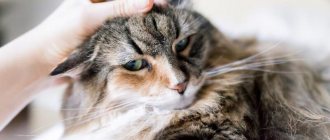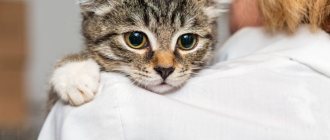Why does a cat meow for no reason? There is always an explanation for such animal behavior. You just need to take a closer look at your pet. You should not punish an animal for disturbing you with its cries. Also, meowing cannot be ignored, because often in this way a cat gives a sign that it is in pain, uncomfortable or scared. In some cases this may be a feature of the breed. For example, Abyssinian and Siamese cats, as well as ragdolls, are characterized by increased “talkativeness”. However, if such behavior has not previously been typical for your pet, then this should be alarming. Next, we will look at the most common causes of cat meowing.
Hunger
A hungry cat makes sounds that sound like a baby crying. In this case, eliminating the cause of this behavior is quite easy; you just need to feed the animal. Often kittens cry due to malnutrition. They often feel hungry because their growing bodies require nutrients. Owners need to learn the rules for creating a cat menu and feed their pet on time. Sometimes owners mistakenly believe that they are giving the animal enough food.
However, there are times when a cat has just eaten, but runs around the table with human food and screams. “Why does the cat meow for no reason?” — this is the question the animal owners ask. This can be explained by the fact that pets are very gluttonous. Cats may beg for food when they smell delicious smells. In this case, you should not follow the animal’s lead. The pet should be taught to eat at strictly defined hours.
Cats often meow when their owners frequently change the types of food they eat. After all, the pet’s body gets used to certain foods. It is especially undesirable to alternate the intake of dry ready-made food and food from the human table. This can lead to digestive problems.
Why do cats say "meow"
There are many reasons why cats meow. Let's look at the most common of them:
Hunger in kittens and adult cats
. Almost all pets tend to meow loudly when they are hungry. And the stronger it is, the louder the “meow” sounds. Pets meow especially demandingly in the morning, when their owner has just lifted his head from the pillow. By the way, in addition to the desire to snack, animals can give the owner signals of thirst by meowing;
The period of adaptation to a new home for kittens
. A baby who has found a new family, finding himself away from his mother cat for the first time, may meow pitifully for the first day or two out of fear and confusion;
Request for help
. Many baby kittens can call their owner for help with a loud meow if they cannot cope with any problem on their own (for example, climb down from a tree, pull a cobweb off their face, etc.);
Desire to attract attention
. The cat walks and meows when it wants its adored owner to play and talk to it. Even the most independent and introverted cats need communication and affection from time to time;
Warning of imminent attack
. Cats love affection, as was already said above, but in moderation. If a pet meows when you pet it, then there is a high probability that it expresses the following: a) the owner is petting in the wrong place (for example, in the abdomen); b) irons for too long; c) strokes with great pressure, causing pain. A cat, annoyed by the owner’s lack of understanding, can, by the way, not only meow. He can also use his main weapons - claws and teeth;
Manipulation
. Owners who are ready to follow the lead of their whiskered-tailed treasures after the first “meow” should know that cats are cunning creatures who love to get their way by screaming. Thus, manipulative cats, meowing, can beg, for example, for an undeserved treat or seek the right to sleep on the master’s table;
The desire to relieve oneself
. Some owners notice that the cat meows in front of the toilet. The situation here is twofold. On the one hand, some animals, feeling the urge to defecate or urinate, always begin to worry and scream. On the other hand, a plaintive meow before visiting the litter box may signal that it is simply painful for the pet to pee or poop (pain during urination can be caused, for example, by urolithiasis or a urinary tract infection, and discomfort during defecation can be caused by a foreign body in the intestine or hemorrhoids );
Disease
. If a cat begins to meow often and loudly, there is a chance that in this way he complains to his owner about health problems. How to recognize that your pet is sick? It is important to recognize warning signs in time that clearly indicate the animal’s ill health (we are talking about stomach and intestinal disorders, loss of appetite, severe thirst, increase or decrease in temperature, etc.). If the cat feels unwell, it is best to take him to the veterinary clinic or call a veterinarian at home;
Request for a walk
. Those pets that have the opportunity to walk on the street, wanting to leave the apartment or house, begin to meow at the door. Moreover, at first “meow-meow” are relatively quiet and timid, but over time they can turn into a real scream if the loving owner does not react in any way;
Great fright
. An animal often meows when it hears a sound that frightens itself (for example, the noise of a hair dryer, the roar of a hammer drill, the howling of a car alarm under the window, etc.). As a rule, meowing caused by fear quickly stops as soon as the pet calms down;
Boredom
. Many pets love to vocalize at night when the house is calm and quiet. As you know, cats are nocturnal animals, which are more alert in the dark than during the day. By meowing, they announce to their owners that it is time to get up and do “business” (for example, treat their pets or play with them);
Stress
. The cat walks and meows every day during periods of emotional distress associated, for example, with a sudden switch to a new type of food, home renovations or a change of residence, hormonal surges after castration or sterilization. It is noteworthy that some animals behave quietly and apathetically when stressed, but others literally do not stop talking;
Cats in heat
. Inexperienced owners may think that a cat is meowing for no reason, but in fact, she uses loud cries to notify nearby males that she is ready to mate. By the way, cats who sense that a cat in heat is nearby also behave noisily;
Conversation with the owner
. Some animals are naturally silent; they speak only in exceptional cases. But it also happens when a cat meows for no reason every day. Meowing of varying volumes is accompanied by literally everything that happens with the purr: meeting the owner from work, eating delicious food, petting and playing, communicating with other pets in the house. It is noteworthy that many cats love to meow melodiously in unison with their owners when they talk loudly on the phone, laugh or swear, sneeze or cough. It seems as if the cats are trying to outshout their owners with their meows. By the way, Siamese are among the most talkative breeds, and Abyssinian, Oriental, Burmese cats and Kurilian Bobtails are not far behind them.;
Excitement before childbirth
. A pregnant cat who is preparing to give birth to baby kittens behaves anxiously and meows often. These “meows” sound especially shrill just before giving birth, when the female is ready for lambing;
Mother cat communicating with her kittens
. A cat meows after giving birth when caring for her offspring. With the help of screams, a pet can warn her babies about something or even inform the owner that her kittens should not be picked up;
Hunting instinct
. Our domestic cats are born predators, passionate hunters who, in a confined space (apartment), can only afford to catch mice, rats, cockroaches, centipedes or flies. Street cats can also catch birds. Many mustachioed creatures can meow loudly and bizarrely while tracking prey.
Estrus
Animals make loud noises during periods of active sexual desire. This is typical for both males and females. Experienced owners are well aware of this state of their pet. However, if estrus occurs for the first time, then the owners often do not understand what is happening to the growing kitten. They are interested in the question: “Why does a cat meow loudly for no reason?” Owners feel that their pet is still too small.
However, kittens enter puberty at the age of 6 - 8 months. The following signs indicate that a cat has entered her first heat:
- rolling on the floor;
- loud meowing and purring;
- raising the back of the body and trampling with paws;
- friction of the body against various objects.
What to do in this case? After all, a cat's heat can last up to two weeks, and the owner is often irritated by the constant cries of the animal, especially at night. If you do not plan to breed your cat, then it is better to sterilize your pet. Special medications for estrus should not be given; they can be dangerous to the health of the animal.
Why does a cat meow for no reason near the door? This behavior is usually characteristic of animals during the period of estrus. At this time, animals actively ask to go outside. However, other reasons are also possible. Cats are very curious. They are interested in the world around them outside the home and may beg for walks. However, experienced owners and veterinarians do not recommend letting cats out of the apartment. On the street, a pet can face many dangers; in addition, a pet can get an infection from stray relatives.
Main reasons
To attract attention
If a well-fed, healthy cat constantly meows, it probably wants to draw the owner’s attention to itself. This is often done by animals that spend long periods of time completely alone. It is important for a person to pay attention to this situation, and if the pet is caressed, asks to pet it and play, it is necessary to pay attention to spending time together. Some breeds of cats, after a long, everyday day, happily talk with their owner, talking about problems and concerns.
If an animal left alone does not find something to do during the day, experienced cat breeders recommend setting up a cat play complex in the room. The cat will be able to have fun in it whenever he wants, then the screams asking him to play will be less.
Diseases
This behavior is often found in animals diagnosed with ICD.
Sometimes a cat's meowing in the morning, during the day, in the evening and at night can indicate health problems. If the pet is sick, the owner notices that the cat behaves strangely, sleeps poorly, does not find a place for itself, looks pitifully, and makes a guttural voice when petting or touching in a certain place. Almost any breed of cat is prone to various hereditary and acquired diseases, among which the following are considered common:
- urolithiasis disease;
- pathologies of the cardiovascular system;
- renal failure;
- diseases of the digestive system;
- helminthiasis;
- viral and bacterial infections;
- injuries;
- poisoning, etc.
Hormonal surges
Usually, a pet’s estrus period proceeds along with vocal accompaniment on her part.
At one year old, cats already show signs of sexual activity. In the spring, the male begins to behave unusually, worry, yell loudly, and asks to go outside near the front door. The animal wanders around the house for a long time, screams for no reason, leaves odorous marks in the corner, and does not allow the owners to sleep even at night. A cat that walks behaves similarly, but less aggressively. The pet purrs unusually, sometimes growls, caresses its legs, raises the back of its body, and jerks its tail from side to side.
In order for a cat to stop meowing during estrus, it is better for the owner to undergo sterilization, of course, provided that the pet does not participate in the reproduction of offspring. Empty estrus negatively affects the health of actively walking animals, provoking various diseases of the reproductive organs.
Experiences
A small kitten meows constantly in the first days after separation from the cat. The baby calls for his mother, who will calm him down, caress him, and protect him. During this period, the owner simply needs to pay as much attention to the cat as possible, to show him that having lost his previous family, he has found a new one, where he is also loved and appreciated. Kittens often meow because they are hungry; they ask a person for food, which cannot be refused. From the age of 2 months after the introduction of complementary foods, it is important to feed babies regularly. The desire to eat a lot is caused by active growth, development and formation of vital organs and systems.
On the eve of delivery, the female may lie down a lot.
Experiences can also affect adult pets. If the cat has become restless, too loud, and cannot find a place for itself, perhaps some kind of anxiety is bothering it, and the animal is meowing to warn the owner about this. Just before giving birth, a pregnant cat shows anxiety. Therefore, if a pet in this situation has become more aggressive, often runs to the litter box, lies down a lot, and refuses to be handled, most likely kittens will be born in the coming days, or maybe even hours.
Boredom and melancholy
Cats that rarely walk outside spend the entire day alone and see their owner only when evening comes, whining or meowing loudly from melancholy and boredom. Such an animal can bother the owner and yell at night, so that the person becomes more attentive and devotes more time. Therefore, as soon as evening comes and all the work is done, you need to take the cat in your arms, talk to him, play your favorite games. Some cats love to be petted while lying down. Then they are silent, quickly relax and immediately fall asleep.
Other common causes
With this behavior, the pet can show the owner that it is hungry.
A common reason for a cat or cat to meow is hunger. If a pet calls its owner into the kitchen, approaches the food standing on the shelf and screams shrilly, then there is no doubt that the animal is hungry. Sometimes it happens that a cat meows for no reason even after eating, while there are no obvious signs of health problems. In such a situation, most likely the animal is trying to find out who is in charge in the house, and whether the owner is ready to dance to the tune, jumping up and fulfilling the requirements at the first call. So that the animal does not wander at night, and it realizes its place in the family, you should not follow the lead. During this period, it is important for the owner to show patience and steadfastness, otherwise the situation may worsen and then it will be difficult to rid the cat of the habit of yelling for no reason.
Can a cat yell for no reason?
In nature, stray cats do not use meowing to communicate with each other. Meowing is a cat's way of communicating with its owner. Cats of some breeds, for example, Siamese-Oriental Croup, Cornish Rex, Turkish Angora, have a habit of talking to their owners: when asked “How are you?” may respond with a loud “Meow.”
But these sounds cannot be compared with the loud screams that cats of these breeds, as well as those of the eastern group (Burmese, Bombay, Bengal, Ocicat, Egyptian Mau) emit during sexual heat. But this is only one, although the most common cause of screaming, and there are many of them, many of which are age-related.
The sound of a cat hissing
Single sound of a short hissing cat
1260-korotkoe-shipenie-4584863250940-zzh47946-zsh5074790
The sound when a cat “gets” a bird sitting in a cage. He is simply infuriated that the bird is not paying attention to him, he growls and makes pseudo throws towards the cage, while emitting a hiss. These sounds can also be placed under a video of an ordinary cat fight - the cat will not be offended.
1261-kot-dostaet-pticu-v-kletke-4584863250941-zzh47946-zsh5074791
The sound when a domestic cat is “fed up” with games, it hisses to make it clear that it wants to rest
1262-koshka-dusja-trebuet-chtoby-ot-nee-otstali-4584863250942-zzh47946-zsh5074792
The sound when a cat is in danger or has been hurt. She screams and hisses. This sound can be heard by the owner of a cat when he accidentally steps on it in the dark. Lying in the path is a favorite pastime of some cats.
1263-koshka-zashhishhaetsja-4584863250943-zzh47946-zsh5074793
The cat just jumped onto the sofa next to the lying cat. But the cat hissed, then growled, and then completely jumped to the floor and ran away.
1264-koshka-razdrazhenno-shirit-na-miroljubivogo-kota-4584863250944-zzh47946-zsh5074794
Warning behavior of a cat. She makes hissing sounds and warning meows.
1265-koshka-ugrozhajushhe-mjaukaet-i-shipit-4584863250945-zzh47946-zsh5074795
Conflict out of nowhere. One cat wants to play, but the other doesn’t - he fights off attacks, growls and hisses. This is not a fight, this is an ordinary ordinary situation that happens at home where a friend’s two cats live.
1266-odin-kot-hochet-igrat-a-drugoj-net-konflikt-4584863250946-zzh47946-zsh5074796
Warning sound to leave alone
1267-preduprezhdaet-chtoby-ostavili-v-pokoe-4584863250947-zzh47946-zsh5074797
The sound of a normal single hiss
1268-shipenie-4584863250948-zzh47946-zsh5074798
And another sound
1270-shipit-4584863250950-zzh47946-zsh5074800
Unfortunately, although rather fortunately, we don’t have cats that spit. During hissing, the cat exhales air forcefully. In a state of the highest degree of excitement, air is pushed out along with saliva, and the cat seems to spit.
The hissing sound is very similar to the hissing of a snake. In biology, this is called “defensive mimicry” - when one animal pretends to be an animal of another species, more terrible and dangerous.
Pregnancy
Why does a pregnant cat meow for no reason? During this period, the animal undergoes serious hormonal changes in the body. Pets often vomit in the morning. The cat feels discomfort. At the same time, the pet does not understand what is happening to it and reacts to a change in its physical state by screaming. This is normal. However, if the cat becomes too restless and constantly refuses to eat, then consultation with a veterinarian is necessary. It is possible that she has a pregnancy pathology.
Some cats may go into heat while pregnant. It usually occurs between the third and sixth weeks of pregnancy. This phenomenon is associated with hormonal disorders. Therefore, if a pregnant cat asks for a cat, she should be shown to a veterinarian.
In late pregnancy, cats meow when they sense that labor is approaching. Sometimes pets make quiet but constant sounds, as if talking with future cubs.
Diseases
Why does a cat meow for no reason for a long time, and it is impossible to calm her down? Most often this is due to poor health. In this case, you need to take your pet to the veterinarian as soon as possible. You should also carefully examine the animal and pay attention to the following signs:
- Screams when the stomach is touched. Such a symptom may indicate intestinal obstruction or helminthic infestation.
- Screams after a fall or walk. Most likely, the animal was injured. You need to carefully examine your pet, treat its wound and take it to the veterinarian.
- A plaintive meow near the tray. This often indicates urolithiasis.
- Old cats scream. In old age, many animals become more talkative. However, in some cases, loud meowing may be a sign of Alzheimer's disease. With this pathology, the animal is disoriented, constantly walks in circles and screams pitifully.
- Constant purring. Such sounds do not always indicate that the animal is experiencing pleasure. In some cases, this indicates cardiac problems. By making purring sounds, the cat is trying to normalize its heart rate. This manifestation can occur with tachycardia.
If you meow for no reason for a long time, you need to pick up the cat and try to calm it down. If the screams do not stop, then most likely your pet is sick.
Possible health problems
The root cause of a cat constantly meowing can be a number of diseases.
- Injuries of varying severity cause a plaintive meow. This could be a bruised paw after an unsuccessful jump, or a serious fracture. The risk group includes older animals whose bones are more fragile.
- With spinal injuries, the meowing turns into hysterical screams, and the animal trembles.
- A quiet meow, accompanied by wheezing, elevated body temperature, and discharge from the nose and eyes, signals the presence of a viral disease.
Injured pet
- Severe poisoning can be determined by loss of interest in food, vomiting, loose stools, and diarrhea. These same signs indicate the presence of worms. Kittens especially suffer from intoxication.
- Severe infectious diseases are characterized by weakness, loss of appetite, and continuous screaming.
- A tick embedded in a sensitive spot on the skin causes the cat to scream, behave extremely restlessly, and constantly scratch the bite site. Ear mites cause you to constantly shake your head and scratch your ears.
- In addition to meowing, an allergic reaction is accompanied by sneezing. The cat shakes its head and scratches its muzzle. His eyes are watering and his nose is running.
- If each bowel movement causes obvious discomfort to the animal. The cat lingers on the tray for an unusually long time, screaming pitifully in the process. Most likely, the pet has problems with the intestines, kidneys, and genitourinary system. This could be cystitis or urolithiasis.
It is not always possible to identify the disease on your own, so if your pet remains restless, you should immediately show it to a doctor. After examination by a veterinarian and carrying out the necessary tests, a diagnosis will be determined and treatment will be prescribed.
Stress
It happens that for several weeks or months a cat meows for no reason. What to do in this case? First of all, you need to make sure that the animal is healthy. If the cat does not have any diseases, then most likely it is a reaction to stress.
Cats are very sensitive to any changes. Some animals even react to rearranging the furniture in the room. Prolonged, incessant meowing in cats is observed when moving to a new place of residence. If you take a small kitten into your home, it may meow pitifully for a long time. This is how the baby reacts to being separated from its mother. Therefore, it is recommended to purchase kittens at least 3 months old; they adapt more easily to a new home.
How to cope with stress in a cat? It is necessary to surround your pet with attention and care. Little kittens need to be distracted from longing for their previous home and mother with the help of toys. In difficult cases, sedatives for animals will help: “Cat Bayun”, “Stop-stress”, “Fospasim”, “Fitex”.
What to do if your cat meows too much
There are plenty of reasons for cats to meow. Let's consider what to do for an owner whose cat vocalizes too often:
- First you need to identify the reason why the cat constantly meows
. The most important thing is to recognize in time if the animal is sick with something. Any alarming symptoms are a reason to consult a doctor; - If a cat begins to meow demandingly after eating
, then you should consider increasing the usual volume of portions; - You can almost always calm a cat down with gentle stroking and quiet conversation
. The owner should pay attention to his pet daily; - Not only games with the owner can save a cat from boredom
. An animal may well play independently if it has interesting toys that can be purchased at any pet store or made independently; - If meowing is caused by stress
, you may need to take sedatives (Cat Bayun, Stop-stress, Feliway, etc.). But it is advisable to carry out treatment after a conversation with a doctor; - But you shouldn’t give in to a manipulative cat
. The animal must know that the leader in the house is a person, so the last word should always be his. Does your pet meow loudly, demanding a tasty morsel from the table (for example, a piece of smoked sausage, which is harmful to the cat’s body)? It's OK! The owner has the right to ignore the loud beggar; - If the animal is active at night
(meows, runs around the apartment, plays and makes noise), the owner should reconsider the daily routine of his naughty dog. The cat simply should not be allowed to get plenty of sleep during the day and evening, so that by night he has only one desire - to sleep sweetly; - Many cats and cats scream because of the call of the flesh
. If an animal is not of breeding value, it is advisable to castrate or sterilize it. Another way is to find a sexual partner for a cat. It is almost impossible to calm a cat during heat or to revive a cat who senses that there is a cat nearby that is capable of mating; - An overly talkative purr can and should be besieged with stern and loud remarks
. Animals always understand by their voice that their owner is angry. But under no circumstances should you hit your pets for “meowing”. Using physical force will simply humiliate and offend the cat.
Territory and its defense
Some cats try to announce their presence to surrounding animals by screaming. Most often this happens when you change your place of residence. A cat, finding itself in an unfamiliar place, begins to “take up space”, marking its territory and telling everyone around about its formidable character.
Over time, this behavior gives way to stable calm, however, the owners still need to endure the period of rapid personality development.
Cat asks for attention
There are times when a healthy and well-fed cat meows for no reason. Why is this happening? Our pets, like little children, love attention. Animals vocalize when they want to be held, played with, or stroked.
Some cat breeds do not tolerate long absences from their owners. Left alone, they can meow for a long time and pitifully. Sphinxes have this character trait. It is not advisable to leave these animals alone for a long time; it will be very stressful for them. In this case, it is advisable to take a second cat into the house.
How to calm an animal
The pet's continuous and intrusive yelling is quite annoying. It not only disrupts the sleep a person needs, but also interferes with concentration on daily activities and provokes destructive affective states. Knowing how to effectively calm a cat is not only beneficial for the health of its owner, but also for the animal itself. Depending on the cause, there are several ways to tame purring.
Joint leisure
Despite the fact that cats are self-sufficient creatures, they easily become attached, and, moreover, they tend to choose an object of adoration for themselves. Having a pet means taking responsibility for its physical and psychological condition. If your pet is ignored and left alone for a long time, it will demand legitimate attention, notifying the outside world about it. In this case, it’s easy to wean an animal off screaming – just spend time with it, play, and communicate. If a four-legged animal has developed hunting instincts, then active and even aggressive games will help; calmer animals are sometimes simply enough to be picked up.
Correct daily routine
In some cases, the cause of a noisy problem may be the lack of a routine consistent with that of furry owners. If a cat sleeps all day on a sunny windowsill, then it is logical that its active phase will begin in the dark, when the owners, tired after work, want to rest. However, they will not be able to do this, since the animal, full of energy, will begin to waste energy in every possible way and ask for food. This incarnation of a nightmare can only be calmed down by working on the correct diet and wakefulness.
Consultation with a veterinarian
As mentioned above, the cause of meowing can be physical discomfort and pain, which should not be present in healthy animals. If the root of the problem cannot be found in matters of communication and scheduling, a trip to the veterinarian is the best solution.
Not all diseases have clear symptoms, and a timely trip to the doctor can save your pet’s life.
Why do kittens cry?
Having adopted a kitten, you need to be prepared for the fact that at first you will have to tinker with it. A baby requires attention just like a child.
Moving to a new home is especially difficult for domestic kittens. In the first days, they are desperately looking not only for their mother, but also for a familiar environment.
To minimize the stress of changing homes, try to give your kitten maximum attention. This applies not only to activity, games and fun, but also to rest time. Your baby may feel lonely and will look for a warm place to sleep. If you give your kitten attention in childhood, it will show you loyalty in the future.
Reasons why a kitten screams:
- Looking for mom;
- Hungry;
- Wants to go to the toilet;
- Bored.
All this can be eliminated by devoting a little of your time to the baby.
Meowing in small kittens
Kittens up to 2.5-3 months are highly dependent on their mother. With their meowing, they inform her about hunger, fear and lack of attention, that is, they do the same thing as adult animals. The only difference is that all the kids run to the cat for help, and not to the person. Because of this, immediately after moving, they experience extreme stress and do not immediately trust their new owner.
Conclusion
If a cat meows loudly, do not rush to draw conclusions and carefully study the situation. Do not forget that a number of symptoms require immediate contact with a veterinarian. Ignoring in the case of pathology is not only useless, but also dangerous, so always show a reaction. The only exception is manipulation. If they are the problem, your attention will only make the unwanted behavior worse.
Do you like the article? 245
Night concerts
Why does a cat meow for no reason at night? This often occurs in animals during estrus. Continuous screams at night may also indicate illness.
However, most often a cat screams at night because it cannot sleep. It is possible that her sleep-wake pattern is disrupted. Night meowing greatly disturbs the peace of the owners. In this case, you need to make sure that the cat sleeps as little as possible during the daytime. It is also useful to arrange active games with the animal more often during the day. This will ensure your pet sleeps soundly at night.
Meowing at night - what to do about it?
If the cat starts yelling at night, then it is useless to shout and swear at him. Cats have more sensitive hearing than humans, so they perceive loud sounds quite painfully. And they can begin to behave completely unpredictably - for example, throwing flowers from window sills, tearing up furniture, etc. Stress can affect the animal's nervous and digestive system - it can become skittish and afraid of people.











